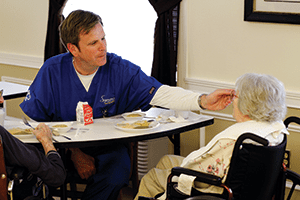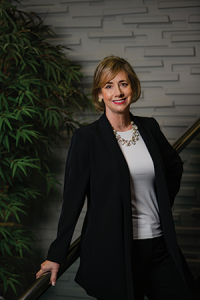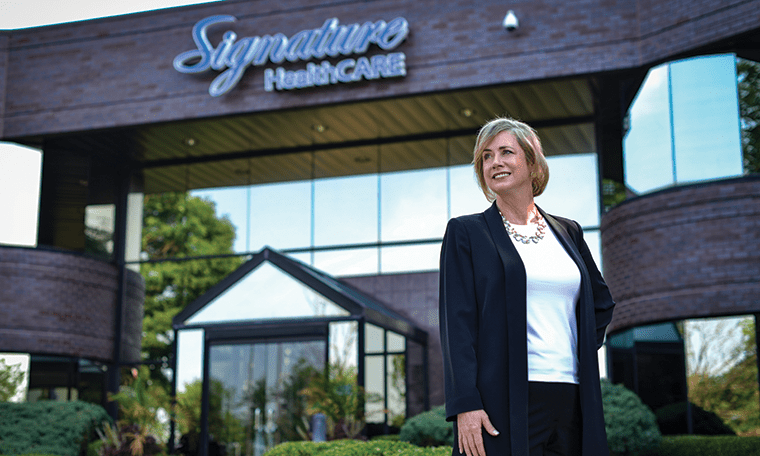In 2013, Mary McNevin was sitting at a table in a Signature Healthcare dining room feeding dinner to an elderly patient with dementia. At first the woman was friendly and chatty, but then she grew agitated and started swearing. “My instructor warned me that she’s prone to hitting,” McNevin said. “So I backed away.”
McNevin wasn’t a nursing assistant in training when the incident occurred. She was the chief learning officer for Signature Healthcare, a provider of long-term care, rehabilitation and health care services with 148 facilities in 11 states and more than 22,000 employees.
A majority of the company’s staff are certified nursing assistants who spend their days fulfilling basic quality of life needs for patients, including bathing, dressing and feeding them. “They are our front line, and the most important people in our facilities,” said McNevin, who earlier this year was named chief people officer for Louisville, Kentucky-based Signature.
The role of a CNA, or certified nursing assistant, can be emotionally and physically challenging, and it is a relatively low paying job — industry averages are less than $12 an hour. To make sure the management team at Signature understands how tough these jobs are, they are all required to complete CNA training and to spend two days a year working in one of the company’s facilities.
“You can’t improve the workplace if you don’t know the work,” said CEO Joe Steier, who came up with the idea for CNA training but relied on McNevin to make it happen.
A Match Made at Penn
McNevin attended the University of Wisconsin at Stevens Point in the 1980s and later received her master’s in business from the University of Wisconsin at Madison in 2000. She got involved in L&D while working at John Deere Credit and later led talent development at the multinational McCain Foods.
While moving up the ranks at McCain, she attended the CLO executive doctoral program at the University of Pennsylvania, where she first met Steier in 2007. “We were classmates, then we were friends,” she said.
McNevin joined the program to advance her career as a global CLO while Steier wanted to understand how to create a learning organization. The two of them immediately bonded. “She was a humble leader and a great teammate, always ready to help,” Steier said.
So in 2012, when Signature Healthcare needed a new CLO, McNevin was the first and only person Steier contacted. She was excited to move into health care, particularly because her mother had been a third-shift CNA when she was growing up. “What we do isn’t glamorous, but it is purposeful work,” Steier said. “I knew Mary would be right for the job, because she could see a path for change.”
Going from a food conglomerate to health care was a steep learning curve, but McNevin embraced the challenge. She signed up for an online course on the Affordable Care Act and formed a CLO group of health care industry leaders to share best practices and network with her new peers. “I wanted to get the lay of the land and figure out what it takes to make a health care business successful,” she said.
She also started sitting in on every executive meeting she could get invited to, wanting to learn the business and figure out its pain points.
“She listened to their problems and over time she brought ideas we had never thought of before,” Steier said. “Now when someone has a problem, she is the first one they turn to.”

Among the first programs she implemented at Signature was the CNA training requirement for all top management, which lead to another innovation for the company. CNA credentialing is state regulated. Each state offers its own CNA training program, but all are basically the same, she said. When McNevin took her training in Kentucky most of it involved logging onto a computer and reading a textbook. “It was the worst educational experience of my life.”
McNevin knew she could do better. She reached out to a colleague at the University of Pennsylvania with a plan to reinvent CNA training. Together they created an adaptive, story-based curriculum featuring videos and real-life experiences. The content is interactive and structured to teach not only the skills CNAs need on the job, but to also transform the mindset of the caregiver.
“The stories feature engaging characters with gripping stories folded into a soap opera story line,” she said. Each of the eight case studies get progressively more challenging so trainees see what the job is really like and how important it is.
The interactive multimedia format is especially useful with the target demographic, she noted. CNAs tend to be people who were not successful in school, or who speak English as a second language, so they are not likely to thrive in a largely text-based learning environment.
“This is a tough job, and you can’t learn it by spending 50 hours reading a book,” McNevin said. Not only will the story-based training make their target population more successful learners, she believes it will help to lower the high rate of turnover among new hires, who are often shocked by the reality of how challenging the CNA job can be. “The first time you change a brief or give someone a shower is pretty daunting,” she said. “The training shows them how difficult it will be.”
Signature Healthcare began piloting the training in facilities earlier this year, and McNevin is already seeing a significant impact. In one facility, the 30-day turnover rate dropped from more than 100 percent — not uncommon in this field — to 20 percent. “It shows that trainees were better prepared and it paid off,” she said.
Finding New Talent
They are now planning to offer the training to potential recruits, which not only ensures new hires will be better prepared for the job, it is also opening up a whole new field of applicants, said Kim Vermilyea, who works in Signature’s Tampa, Florida, location as chief operations officer. “Before this program, you had to be a CNA to apply for a position,” she said. “This gives us the ability to take people who have an interest in the job but didn’t know CNA training existed or didn’t have the means to get certified.”
Finding new pools of candidates for these positions is a top priority for the company. Health care jobs are expected to grow faster than any other industry, and positions for nursing assistants and orderlies are projected to grow 17 percent from 2014 to 2024 — much faster than the average for all occupations, according to the Bureau of Labor Statistics. “Now we find candidates with potential and train them in the way we want them to be trained,” Vermilyea said.
McNevin’s long-term goal is to sell the training program to other health care facilities, which will create a revenue source for the company while raising the level of expertise in the CNA community. “We hire each other’s staff all the time, so it is in our benefit to improve the skills of every health care worker.”
The entry-level training for CNAs was an important first step, though McNevin wanted to do more than just get them in the door. Because these positions are low paying they have a high rate of turnover. “If someone gets offered 5 cents more an hour from another facility, it can be an incentive to leave,” she said. She wanted to create a place where CNAs could build a future for themselves and for their families. “We don’t want people to see this job as a dead end. We want them to see it as a career.”
To do that, McNevin worked with Vermilyea to create Pinnacle, a clinical career ladder for CNAs that will help keep them engaged with the company and improve their skills through training and development to increase their earning potential. The program offers four phases of training, each of which provides a salary increase and additional skills and leadership responsibilities.
“A lot of people get into the CNA job as a means for survival and they get stuck,” Vermilyea said. “Pinnacle gives them the ability to go back to school without paying tuition or taking time off so they can better themselves.” At the same time, Signature Healthcare gets a better-trained staff and sees a lower turnover rate. “Everyone wins.”
Learning Is Just One Approach
McNevin’s ability to combine the notion of purpose-driven work with real world business results is why she has thrived at Signature Healthcare and why Steier is so happy he found her. “Mary knows how to leverage learning as a viable solution to business problems,” he said. “She made our team think differently about what a CLO’s role is.”
Along with creating career paths for front-line workers, McNevin established communities of practice for directors of nursing, who each lead nursing for their own facilities. The communities of practice give them access to a network of peers who can help solve problems and share best practices. They also have a dedicated peer mentor who works on-site with new directors to help them acclimate to the culture and workplace systems before they are left to lead the facility on their own. “They get up to speed faster, and we make sure they have what they need to be successful,” McNevin said.

She also makes time to meet regularly with business unit leaders to understand what problems they face and whether training can provide a solution. Her solutions aren’t always training based, Steier said. For example, to address challenges in recruiting, she came up with an idea to open an in-house agency model that offered flexible scheduling, allowing retirees and part-timers to be hired who could work at multiple facilities as needs arise. This allows the company to fill gaps in the workforce with people specifically trained on Signature’s systems and culture. These were candidates the company had never considered before, and it addressed a real business need.
Her commitment to improving the talent and experiences of workers across the organization has led to reductions in turnover, improved engagement and numerous awards including a 2015 Best Places to Work in Healthcare from Modern Healthcare magazine, and the 2015 BEST Award from the Association for Talent Development.
McNevin also measures the impact of every program to demonstrate business results, often benchmarking results against peers across the industry to provide executives with perspective on what the company has accomplished and where there is room to improve. And if a program doesn’t measure up, she shuts it down, Steier said. “There are no sacred cows in her department.”
Steier noted that many C-suite executives see learning as a cost they have to fund, but McNevin has proven that learning programs can deliver real business value. “Over time our board has come to realize that if they give Mary a dollar, they will get $1.50 back, and that got their attention,” he said.
Over time the company has expanded McNevin’s budget. And as Signature’s new chief people officer, McNevin now oversees recruiting and career development for the company. Her influence has encouraged the team to take a more holistic approach to problem solving, Steier said.
“Whatever the company pain point is she wants to be involved.”
Sarah Fister Gale is a writer based in Chicago. She can be reached at editor@CLOmedia.com.















